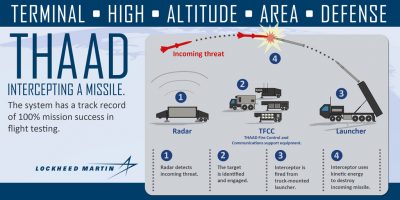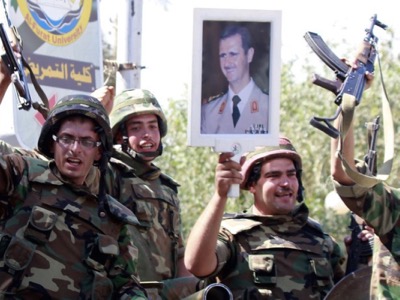Threats to World Peace and America’s Imperial Wars: Syria, Afghanistan, North Korea
MOAB, tomahawks and the threat of nuclear war

Afghanistan has gained lead story status in the western corporate and government-sponsored media outlets again for the wrong reasons.
This Central Asia state has been at war since the late 1970s when the United States under the then President Jimmy Carter developed a counter-insurgency program to remove the socialist-oriented administration ruling from Kabul.
Of course today there is largely no mention in these same press agencies about the organization, training, funding and diplomatic cover provided by Washington through the Central Intelligence Agency (CIA), the Pentagon and State Department for al-Qaeda (the core) which facilitated the armed struggle waged against the Soviet-backed system in Afghanistan.
With the intervention of the Soviet army in December 1979, the stage was set for continuing interference by successive U.S. administrations from Carter to the present regime of President Donald Trump. Although Trump suggested during his campaign that he would lessen involvement by Washington in geo-political flashpoints ignited by both Republican and Democratic heads-of-state, he also said of the proliferation of the Islamic State of Iraq and Syria (ISIS) that “I will bomb the shit out of them.”
Perhaps this is the sentiment among his supporters that he was appealing to when the decision was made to drop the Massive Ordinance Air Blast (MOAB) bomb on tunnels in Afghanistan on April 13. The attack was carried out in the Achin district of Nangahar near the border with Pakistan.
The bomb utilized is technically called the GBU-43 and reportedly weighed 21,000 pounds. It is a GPS-guided weapon and was dropped by the M-130 fighter aircraft.
Although a tactical nuclear weapon is far more powerful and damaging to targets than the MOAB, its usage is clearly a warning not only to the people of Afghanistan as well as those in the Democratic People’s Republic of Korea (DPRK). The DPRK has been developing and testing its own medium and long range missiles. The DPRK is now a nuclear power and this factor has served as a deterrent to bombings and invasions by the Pentagon and NATO.
Despite the size of the ordinance, Afghan Ministry of Defense spokesperson Dawlat Waziri said
“No civilian has been hurt and only the base, which Daesh used to launch attacks in other parts of the province, was destroyed.”
However, a British Broadcasting Corporation (BBC) report claimed that some 36 Islamic State fighters were killed in the bombing.
Nonetheless, the usual narrative for the imperialist states which engage in such blanket bombings of other countries in Asia, the Middle East and Africa is that they only target so-called “terrorists.” More often than not the actual victims of these raids turn out to be civilians who are the most vulnerable within war zones. The direct U.S. involvement in Afghanistan and Pakistan has resulted in the deaths and injuries of hundreds of thousands of people. Millions have been dislocated from both countries while the current administration of Trump has no intentions of withdrawing the 9,000 troops still remaining the region.
Imperialist interventions through the Pentagon and the North Atlantic Treaty Organization (NATO) have done tremendous damage to the Central Asia region. The flood of refugees out of this area contributes to the overall crises of displacement and political turmoil extending across Asia to the Middle East and Africa. The countries that have been the most severely impacted are those where U.S. military forces laid waste over a period of decades.
The Democratic People’s Republic of Korea (DPRK) Defies U.S. Imperialism
April 15, 2017 represents the 105th anniversary of the birth of the founder of the DPRK, Kim Il Sung, a nationalist and communist leader who fought against both Japanese and U.S. imperialism for many years. The Korean Revolution grew out of the anti-colonial struggle against Japan and the consolidation of patriotic forces in defense of its independence and sovereignty.
After 1945, Kim Il Sung and other revolutionaries sought to unite the Peninsula under a system of socialist development. Nevertheless, the U.S. had other plans based on its desire to curb Soviet influence in Asia in the aftermath of World War II. The DPRK was founded in September 1948 prompting the antagonism of Washington.
The following year in October 1949, the Communist Party of China took control of the mainland of that Asian state. Moreover, in Vietnam, the forces aligned with Ho Chi Minh had established a revolutionary Democratic Republic in the North and sought to also unify the country under one government in September 1945.
Consequently, the Cold War outlook of the U.S. maneuvered the United Nations to back an invasion into Korea aimed at eradicating the revolutionary government of Kim Il Sung. By June 1950 the imperialists were staging a full scale assault on the country. Later the massive bombing of Korea compelled Mao Tse-tung and the Communist government to back the DPRK in the war against the U.S. The Chinese deployed over 500,000 People’s Volunteer Forces which assisted in beating back the U.S. from establishing full control of the North leading up to the border with China.
An armistice agreement between the U.S. and the DPRK has been in effect since July 1953. This means that the two states are technically still at war. The provocations of Washington have been continuous for decades. During the so-called Korean War the U.S. had threatened to use an atomic bomb against the DPRK and the People’s Republic of China.
Kim Jong Un, the present leader of the DPRK and the grandson of Kim Il Sung and son of Kim Jong Il, has vowed to retaliate in the event of a preemptive strike by the Pentagon. The government has held a series of nuclear missile tests which have illustrated their capacity to inflict damage on U.S. warships, military bases from the Peninsula to Japan.
At present the U.S. is placing the Terminal High Altitude Area Defense (THAAD) anti-missile weapons system in South Korea which serves as a base of imperialist operations in Asia. Both the DPRK and China oppose THAAD. However, the Trump administration is determined to keep this program intact as a way of threatening Pyongyang and Beijing.
The DPRK government under the Worker’s Party (WPK) led by Marshall Kim Jong Un is maintaining its defiance. In an article published by the Korean Central News Agency (KCNA) on April 11, it said:
“Service personnel of the Army, Navy, Air and Anti-Aircraft Force of the Korean People’s Army held a ceremony at the plaza of the Kumsusan Palace of the Sun on April 10 to pay high tribute to Generalissimos Kim Il Sung and Kim Jong Il and vow to remain loyal to Supreme Commander Kim Jong Un on the occasion of the Day of the Sun.”
This same report goes on to note that:
“Present there were KPA Vice Marshal Hwang Pyong So, member of the Presidium of the Political Bureau of the Central Committee of the Workers’ Party of Korea, vice-chairman of the State Affairs Commission of the DPRK and director of the General Political Bureau of the KPA, KPA Vice Marshal Ri Myong Su, chief of the General Staff of the KPA, Army General Pak Yong Sik, minister of the People’s Armed Forces, and other commanding officers of the KPA.”
Syria War Escalates Under Trump White House
On April 6 news reports revealed that the Pentagon had fired nearly 60 long-range cruise missiles from a U.S. Navy Destroyer into the Sharyat airbase in Syria. This blatant act of aggression was said to be in response to the deaths of people from a putative chemical weapons attack a few days earlier in the village of Khan Sheikhou.
The Syrian government of President Bashar al-Assad denied any involvement in the attacks and said in an interview with the Agence France Press (AFP) on April 13 that this story was a “fabrication.” Russian Federation foreign ministry officials have called for an independent investigation into the incident where people died from sarin gas. President Assad has also welcomed such an investigation.
U.S. administration spokespersons have provided no concrete evidence that the Syrian Arab Army was at all involved in the attack. The damage to the airfield by the tomahawk missiles was wholly unwarranted and could have easily sparked a wider war involving Russia and the Islamic Republic of Iran.
Conclusion
All of these wars from Afghanistan and Iraq to the Korean Peninsula and Syria were based upon falsehoods and motivated by the desire for geo-political hegemony and the control of strategic resources.
If it is common knowledge that the U.S. manufactures untruths to justify war from the beginning of the post-World War II period through the conclusion of the 20th century and well into the final years of the second decade of the 21st century, it is not beyond reason that the current saber rattling with Afghanistan rebels, the DPRK government and the Syrian state is based upon the same imperialistic aims and objectives.
In addition to the tensions in Central Asia, the Middle East and the Korean Peninsula, Trump has deployed more U.S. troops to the Horn of Africa nation of Somalia just weeks after he pledged to intensify bombing operations in this oil-rich embattled country. The government of the Bolivarian Republic of Venezuela in South America is also waging a defensive war against destabilization efforts funded and coordinated by Washington. A massive U.S.-supported campaign to force the resignation of the African National Congress (ANC) government of President Jacob Zuma in the Republic of South Africa has compounded economic uncertainty in the continent’s most industrialized state. Similar to what has been taking place for years in neighboring Zimbabwe the imperialists have never been in support of genuine independence and unity in Africa.
Antiwar and social justice movements in the imperialist countries must oppose Pentagon and NATO interventions in these geo-strategic areas irrespective of the rationales provided by the Trump administration and its allies. In order for genuine peace to be achieved internationally it requires the dismantling of the war machines emanating from Washington, London, Paris and Brussels.


